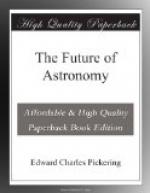Having thus considered, among others, some of the ways in which astronomy is not likely to be much advanced, we proceed to those which will secure the greatest scientific return for the outlay. One of the best of these is to create a fund to be used in advancing research, subject only to the condition that results of the greatest possible value to science shall be secured. One advantage of this method is that excellent results may be obtained at once from a sum, either large or small. Whatever is at first given may later be increased indefinitely, if the results justify it. One of the wisest as well as the greatest of donors has said: “Find the particular man,” but unfortunately, this plan has been actually tried only with some of the smaller funds. Any one who will read the list of researches aided by the Rumford Fund, the Elizabeth Thompson Fund or the Bruce Fund of 1890 will see that the returns are out of all proportion to the money expended. The trustees of such a fund as is here proposed should not regard themselves as patrons conferring a favor on those to whom grants are made, but as men seeking for the means of securing large scientific returns for the money entrusted to them. An astronomer who would aid them in this work, by properly expending a grant, would confer rather than receive a favor. They should search for astronomical bargains, and should try to purchase results where the money could be expended to the best advantage. They should make it their business to learn of the work of every astronomer engaged in original research. A young man who presented a paper of unusual importance at a scientific meeting, or published it in an astronomical journal, would receive a letter inviting him to submit plans to the trustees, if he desired aid in extending his work. In many cases, it would be found that, after working for years under most unfavorable conditions, he had developed a method of great value and had applied it to a few stars, but must now stop for want of means. A small appropriation would enable him to employ an assistant who, in a short time, could do equally good work. The application of this method to a hundred or a thousand stars would then be only a matter of time and money.
The American Astronomical Society met last August at a summer resort on Lake Erie. About thirty astronomers read papers, and in a large portion of the cases the appropriation of a few hundred dollars would have permitted a great extension in these researches. A sad case is that of a brilliant student who may graduate at a college, take a doctor’s degree in astronomy, and perhaps pass a year or two in study at a foreign observatory. He then returns to this country, enthusiastic and full of ideas, and considers himself fortunate in securing a position as astronomer in a little country college. He now finds himself overwhelmed with work as a teacher, without time or appliances for original work. What is worse, no one sympathizes with him in his aspirations,




